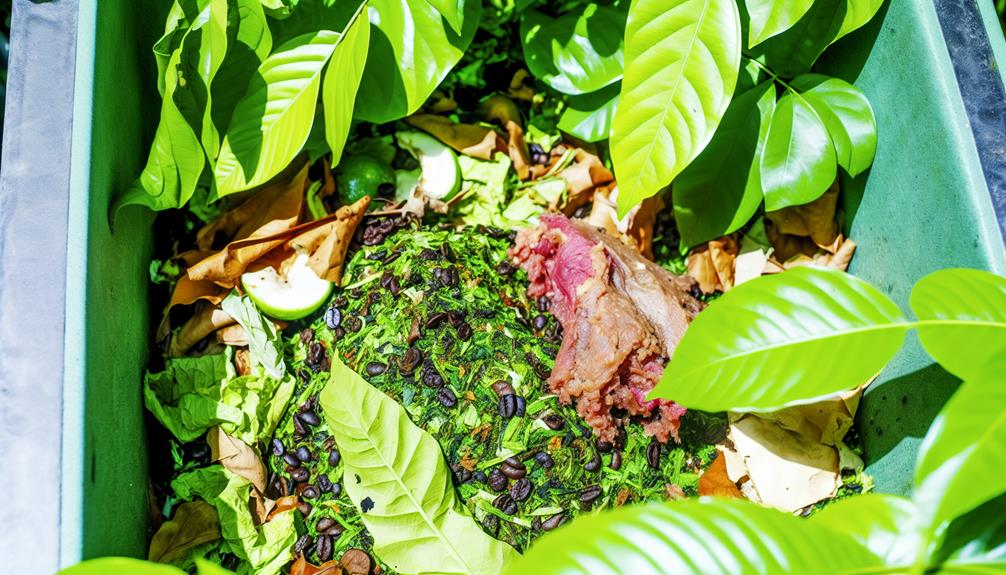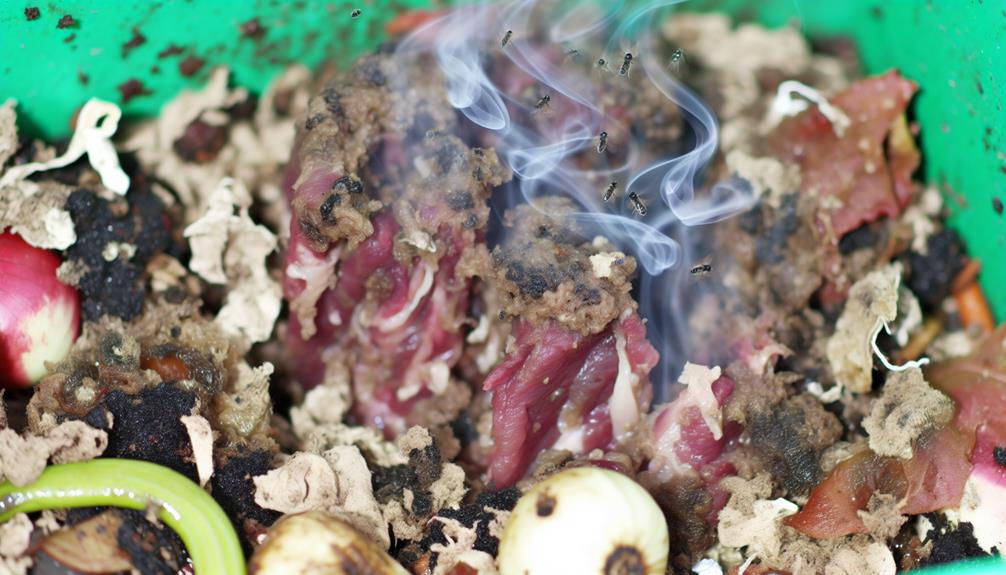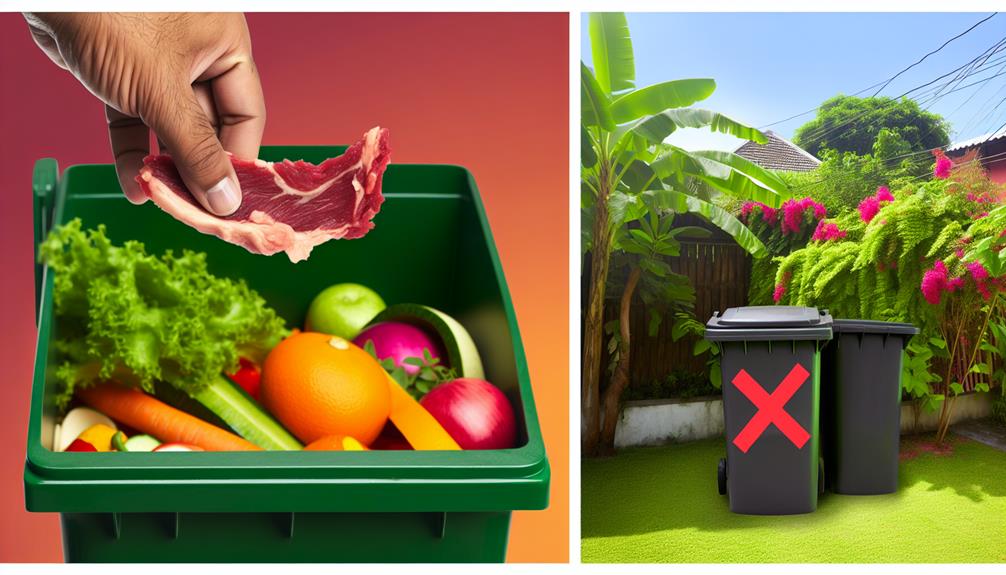

Yes, you can compost steak, but it’s a bit tricky. Chop the steak into small pieces to speed up decomposition. Guarantee your compost pile is well-aerated and balanced with carbon-rich materials like leaves or paper. Monitor the temperature to keep it between 140-160°F, which helps kill pathogens.
Regularly turning the pile and maintaining moisture levels will also prevent odors and pests. Be cautious of the slow breakdown rate and potential harmful bacteria. Alternatively, consider Bokashi bins or waste recycling programs for safer meat composting. For more detailed instructions and tips, there’s plenty more to explore.
Composting meat basics start with understanding the unique challenges and benefits of adding steak to your compost pile. When you introduce meat, like steak, into the composting process, you’re dealing with a different type of decomposition compared to plant matter. Meat decomposition requires a higher level of attention and care to avoid potential problems such as odor and pests.
First, you need to balance your compost pile with plenty of carbon-rich materials, like dry leaves or cardboard, to counter the nitrogen-rich steak. This balance is essential for efficient decomposition and to keep your pile from smelling.
Chop the steak into small pieces to speed up the composting process. Smaller pieces break down faster, integrating more seamlessly with the rest of the compost materials.
Next, make sure your compost pile is well-aerated. Turn it frequently to promote oxygen flow, which aids in breaking down the meat. Keep a close eye on the temperature; meat decomposes best when the pile is hot, around 140-160°F. This high temperature helps to kill any potential pathogens.
Also Read: Can You Compost Basil?
One major benefit of composting steak is the added richness in nutrients like nitrogen that can greatly enhance the quality of your compost. Steak and other meat scraps contain high levels of nitrogen, an essential nutrient for plants. When you add steak to your compost, you’re enriching it with valuable nutrients that can help your garden thrive.
Moreover, composting steak contributes to reduced waste. By diverting steak scraps from the landfill to your compost pile, you’re making a positive environmental impact. It’s a sustainable practice that can help you reduce your household waste and contribute to a circular economy.
Here’s a quick comparison of the benefits:
| Benefit | Description |
|---|---|
| Nutrient Enrichment | Adds high nitrogen content to compost |
| Reduced Waste | Decreases landfill waste and promotes recycling |
| Enhanced Soil Health | Improves plant growth and soil quality |
Also Read: Can You Compost Butter?
However, the presence of foodborne pathogens is essential to consider when adding steak to your compost pile. Meat, including steak, can harbor harmful bacteria like E. coli and Salmonella, which can survive the composting process if not managed properly. This could potentially contaminate your compost, posing health risks to you and your garden.

Odor control is another significant aspect to consider. Decomposing steak produces strong, unpleasant smells that can attract pests like rodents, raccoons, and flies. These pests not only disrupt your composting efforts but can also create a nuisance in your yard.
To mitigate these odors, it’s important to balance your compost pile with adequate amounts of carbon-rich materials like leaves or straw, which help absorb moisture and reduce smell.
Additionally, the decomposition rate of steak is much slower compared to plant-based materials. This slow breakdown can delay the overall composting process, making it less efficient. You’re likely to find chunks of undigested meat remaining in your pile long after other materials have decomposed.
Addressing these challenges requires careful management and attention to detail, ensuring your composting process remains safe and effective.
To safely compost steak, make sure you maintain high temperatures in your compost pile to effectively kill harmful pathogens. Aim for temperatures between 140°F and 160°F. You’ll need a compost thermometer to monitor this. Achieving these temperatures means balancing your green waste, like kitchen scraps and grass clippings, with brown materials such as leaves and cardboard.
Turn your compost regularly. This guarantees even distribution of heat and accelerates decomposition. It’s vital to keep the pile moist but not too wet; think of a wrung-out sponge. Adequate aeration is also important. Add materials in layers, alternating between green waste and brown materials. This helps to maintain the right balance and promotes microbial activity.
When adding steak to your home composting pile, chop it into small pieces. This speeds up the breakdown process and minimizes the risk of attracting pests. Cover the steak with a generous layer of brown materials to mask any odors.
Also Read: Can You Compost Cabbage?
Exploring alternative disposal methods can help you manage steak waste without compromising your compost pile.

One practical solution is to repurpose your steak scraps as animal feed. If you have pets like dogs or cats, small amounts of cooked steak can be a nutritious treat. Always make sure the meat is free of seasoning and bones to prevent health issues. Alternatively, local farmers or animal sanctuaries might accept meat donations for their animals.
Another viable method is waste recycling. Many cities offer organic waste recycling programs where you can dispose of meat products responsibly. These programs often have specific guidelines, so check with your local waste management facility to understand the requirements. Meat can also be processed in specialized anaerobic digesters, which convert organic waste into biogas and fertilizer.
If animal feed and waste recycling options aren’t available, consider using a dedicated meat composting system. These systems, such as Bokashi bins, use fermentation to break down meat safely. This method prevents harmful pathogens from contaminating your regular compost pile.
It takes several months to a year for steak to fully decompose in compost, depending on moisture levels and microbial activity. Keep your compost moist and aerated to support the microbes breaking down the material.
Yes, composted steak can attract wildlife to your garden. To prevent this, employ wildlife deterrents and make sure your garden fencing is secure. By doing so, you’ll keep your garden community safe and thriving.
You’ll want a compost bin with sturdy materials and tight lids for meat composting benefits. These bins help control odors and deter pests, making your garden more sustainable and welcoming for everyone in your community.
If you manage temperature control properly, composting steak won’t produce unpleasant odors. You can join a community of eco-conscious individuals by mastering odor management and ensuring your compost stays healthy and smell-free.
You can compost steak bones with the meat, but it requires careful compost layering. Bones add rich bone nutrients, but they decompose slowly. Guarantee proper layering with greens and browns to speed up the process and minimize odors.
To compost steak safely, make sure you use a hot composting method to reach temperatures that kill pathogens. Bury the steak deep within the pile to deter pests, and balance with ample carbon-rich materials.
Be vigilant about turning the pile to maintain heat and aeration. If composting meat feels too challenging, consider alternative disposal methods like municipal organic waste programs.
Following these practices guarantees you can compost steak efficiently and safely.
